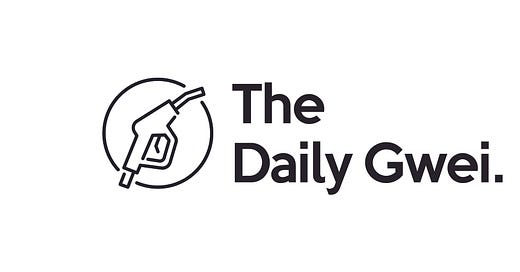Civilizational Infrastructure - The Daily Gwei #371
Ethereum is a civilizational trust anchor for the world.
Ethereum is being built to be something truly magical - a system that can offer better security, decentralization and settlement guarantees than literally anything else on the planet. To achieve this, Ethereum layer 1 must be kept “limited” in order to keep it possible for regular users to run full nodes and validators on consumer hardware while also ensuring overall chain stability and liveness. Though in saying that, there will still be scaling improvements at layer 1 - namely sharding and statelessness - but these will just work to enhance the layer 2 ecosystem and allow them to scale up to tens of millions of TPS.


As Ameen puts it above, Ethereum is a civilizational trust anchor - it is where humanity can go to for the ultimate source of truth on basically anything. Ethereum’s layer 1 will come to consensus and guarantee the validity of whatever is placed onto it - from rollup proofs to ENS name registrations. And then, once Ethereum moves to Proof of Stake, the chain will finalize every 12 minutes which means 2/3 of the total ETH at stake (tens of billions of dollars) will guarantee that the chain can’t ever “go back” and revert activity up to the point of finalization. Nothing else on the planet can give users such a strong guarantee of settlement and this is one of the reasons why rollups and other similar constructions have decided to anchor themselves to Ethereum.
Now, a good settlement layer has both strong technical & social guarantees and I believe that Ethereum is the only system that currently meets both of these criteria at scale. I outline the technical side in more detail here so I’ll focus on what Ethereum’s social guarantees are for now. Firstly, a settlement layer needs to have “credible neutrality” meaning that it needs to not have a bias to any individuals or organizations. Ethereum achieves this in a few ways - the first is by having a fair token distribution as the original sale of ETH was open to everyone and had no KYC, Ethereum has had a long PoW phase to distribute tokens, it’s had many boom and bust price cycles to get tokens changing hands and more. Additionally, the Ethereum network is permissionless to deploy to and even if people “shame” others for creating less-than-savory things (such as ponzis), there’s nothing anyone can do to stop it. No matter what is posted to Ethereum layer 1, it will come to consensus and guarantee settlement all the same.
Next, we can look at Ethereum’s overall cultural spirit which is one of collaboration, innovation, a deep respect for decentralization and a strong social defense system that isn’t toxic in nature. There is also a culture of Ethereans caring deeply about decentralization, open-source and taking security very seriously. This leads to users being more likely and more able to run full nodes/validators, the wider ecosystem is more aligned on the long-term even if taking short-term shortcuts would be an “easier” path, and Ethereum’s roadmap is based on hard science rather than pie-in-the-sky fantasies. All of this culminates in a very strong social layer that works to complement the technical layer in order to keep Ethereum a credibly neutral platform for the world.
I know that these things may all seem esoteric to the average crypto participant but I believe that they are the very backbone of this entire ecosystem. Without a strong technical layer, Ethereum will fail to be decentralized, secure & scalable and without a strong social layer, there will be no one to set the culture, defend the ecosystem against both technical & social attacks, and ensure that the technical layer is on the right path.
Ethereum is an emergent ecosystem of everything I’ve outlined above - let’s fight to keep it that way.
Have a great day everyone,
Anthony Sassano
Enjoyed today’s piece? I send out a fresh one every week day - be sure to subscribe to receive it in your inbox!
Join the Daily Gwei Ecosystem
All information presented above is for educational purposes only and should not be taken as investment advice.




